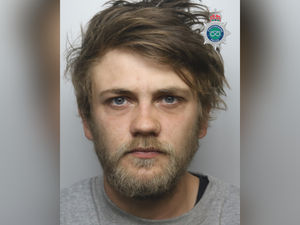Bert Williams - Great goalkeeper, wonderful man
One by one they leave us, as they must. These men of great deeds, each played their role in a legend that has defined the history of Wolves but even they cannot defy the ticking of the clock writes Martin Swain.
It is never easy to establish in absolute terms an order of merit for any football club. At Wolves, one man's Broadbent is another man's Hibbitt; one man's Wagstaffe is another man's Hancocks; somebody's Wright is somebody else's Bailey.
Today, however, we know we are taking a moment to salute unquestionably and unashamedly one of the finest of them all.
From the eye-witness accounts that fill the archives of the Wolves story, we know Bert Williams was a fantastic goalkeeper. His greatest triumph, however, was that he was an even more wonderful man.
Bert Williams: Death of a Wolves legend - More pictures
'Bert Williams was the best' says World Cup winner Gordon Banks
'He was the ultimate legend': Wolves keepers past and present pay tribute to Bert Williams
Wolves' Jez Moxey and Steve Morgan pay tribute to Molineux hero Bert Williams
Star Comment: Mourning the passing of a footballing gentleman
As fiercely competitive as he must have been to achieve all he did on the pitch, as brave as he had to be to survive a more brutal game, Mr Williams was as humble and gentle-spirited a human being as you could wish to meet.
There was toughness and great fortitude in the man, both in the peak of his professional days and then in the long years of retirement, darkened as they were by the loss of his beloved wife Evelyn. But always to meet the great man was to touch the finest qualities of our human condition.
Half an hour with Bert in his beloved Shifnal bungalow, home to a collection of memorabilia that I'd wager would bring tears to the eyes of generations of Wolves fans, was to be cleansed of all the misgivings held for the game today. Not because of any simplistic "it were better in my day" platitudes; quite the opposite, he had level respect and admiration for the footballers and the game of the 21st century. But simply because there was a purity in his spirit which spoke of a man who played out his time through the most noble elements of sportsmanship.
There was never any resentment or bitterness at missing the era of affluence. There was no carping about lesser players being elevated beyond their ability.
Always a fitness fanatic, he was fascinated by the game's athletic and physical development of the last 50 years which almost made him embarrassed to pose for pictures alongside one of his most ardent admirers, the 6ft 6in Matt Murray.
He was pushing 90 by the time that happened and age had withered those bones a touch. "People will look at the pair of us and not believe we were of the same trade," he used to say with a self-deprecating chuckle.
But you ask Murray which of the two were giants and you know what the answer would be.
Mr Williams – no, let's call him Bert shall we, because that is how Wolverhampton knew him – is one more figure the city has lost from its very own golden generation. Their impact cannot ever be forgotten just as it should not be under-estimated because it brought to an otherwise unremarkable and unfashionable town a global recognition that sustains to this day. Wolves have been a long time away from the epic achievements of Mr Williams and his team mates but the imprint is still visible. It was Bert who would still receive correspondence from around the world, sometimes addressed simply to "The Cat, Wolverhampton, England". They found their way to Shifnal still.
Ah yes, The Cat. There were many landmark performances. For example a display at Arsenal which was rewarded by a standing ovation from the old Highbury crowd and a particularly heroic performance in a 1949 FA Cup semi-final against Manchester United when Wolves, effectively reduced to nine men with two defenders badly injured before the days of substitutes, earned a replay because of a string of scarcely-believable interventions from their goalkeeper.
But when England beat Italy 2-0 on November 30 of that same year in an international friendly at White Hart Lane, a watching Stan Cullis labelled Bert's performance as the greatest he had ever seen.
Even more impressed were the Italian press. "Il Gattone" ran the memorable headline from Rome's print runs as stories of the game were filed back: "The Big Cat".
Which is interesting really because Bert was never the biggest keeper but relied instead on an agility which was both natural and also the result of hours in the gym.
On those little tours of his archive collection, I would frequently stop and look at some of the pictures that caught him in full spring, leaping to make a spectacular save inches from the angle of post and bar.
There was one in particular which brought home the enormity of Bert's ability and the scale of his celebrity, a photograph of him arching upwards and backwards to make a save during a 1-1 draw against Spain at the Bernabeu in 1955. In the background is a crowd so vast, so enormous, the image delivers a vivid reminder of the game's first boom era. Whatever else happened in the match, the imprint left by Bert ensured that even in his later years the letters still came in from Madrid and beyond.
"Look at that Bert," I would say. "Look how far you are off the ground there."
"Well I had to be," he used to say "because I was never the biggest."
In all, Bert played 420 times for Wolves after being recruited from Walsall, winning FA Cup final and Championship medals.
He played 24 times for his country although, in a flip side to that famous game against the Italians, he is also remembered for being in goal the day this nation suffered arguably its most humiliating result, the 1-0 defeat to a rag-tag bunch of no-hopers then representing the USA.
When the 2010 World Cup finalists were drawn for that rematch in South Africa, the media descended on Bert's home, much to his bemusement and the concern of those who protected his welfare. But he coped splendidly.
He never stopped caring for Wolves, sharing in the joys and disappointments of the later years, but that dovetailed with another devotion when he was widowed in 2002 .Bert then dedicated himself to raising money for the fight against Alzheimer's, the cruel disease which had taken Evelyn. It was a source of deserved pride that he reached his target of £150,000 before he became too infirm to continue fundraising.
He eventually received the MBE in 2010 but there are lords roaming Westminster far less deserving of a knighthood which would have more accurately reflected Bert's contribution to our lives. Mind you Bert, always so active and spirited, hated getting old.
"I hate going down the supermarket and getting my shopping and the girl at the checkout speaks to me as if I can't hear her or understand what she's saying. 'Is that it love? do you need a hand with those bags?' It's terrible. I tell 'em 'I'm old but I'm not deaf or stupid you know'."
That fire never left him but neither did the humility. It occurs to me that as his family now grieve they may ponder his epitaph. Personally, I could think of nothing finer than his reflections on such an acclaimed career.
"I did what I loved, had respect from people and toured the world," he said. "It was a wonderful thing. How can you ask for more than that? I never refused any autograph, no matter what
I was doing. To me, it was a privilege to be asked."
I beg to differ. The privilege was all ours Bert; the privilege was all ours.





